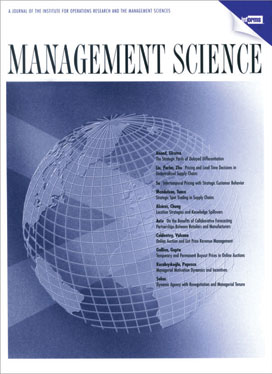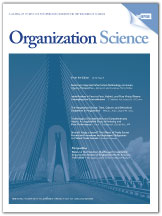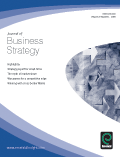Academic articles
Practitioner articles
Working papers
Books
Book chapters
Case studies
Other publications
Subject(s)
Finance, accounting and corporate governance
Keyword(s)
credit rating, accounting, financial statement analysis, liabilities, loan, collateral, financial statement key ratios
Secondary Title
Lexikon des Rechnungswesens
Pages
129–132
ISBN
3486590928
Subject(s)
Economics, politics and business environment
Keyword(s)
competition policy, merger control, market definition, state aid, regulation
Volume
38
Journal Pages
287–314
Subject(s)
Marketing
Keyword(s)
CSR, marketing, corporate identity, consumer-company identification, identity alignment, marketing strategy
The paper integrates and builds on extant thinking in corporate marketing and CSR to provide an identity-based conceptualization of CSR. Based on this, it positions CSR as an optimal managerial tool for promoting alignment between multiple corporate identities (e.g., internal, external), which ultimately leads to key benefits for the company.
With permission of Emerald
Volume
45
Journal Pages
1353–1364
Subject(s)
Finance, accounting and corporate governance
Keyword(s)
default prediction, expected loss, recovery rate
In this paper we focus on modeling and predicting the loss distribution for credit risky assets such as bonds and loans. We model the probability of default and the recovery rate given default based on shared covariates. We develop a new class of default models that explicitly account for sector specific and regime dependent unobservable heterogeneity in firm characteristics. Based on the analysis of a large default and recovery data set over the horizon 1980-2008, we document that the specification of the default model has a major impact on the predicted loss distribution, while the specification of the recovery model is less important. In particular, we find evidence that industry factors and regime dynamics affect the performance of default models, implying that the appropriate choice of default models for loss prediction will depend on the credit cycle and on portfolio characteristics. Finally, we show that default probabilities and recovery rates predicted out-of-sample are negatively correlated, and that the magnitude of the correlation varies with seniority class, industry, and credit cycle.
© 2011 INFORMS
Volume
57
Journal Pages
1267–1287
ISSN (Online)
1526-5501
ISSN (Print)
0025–1909
Subject(s)
Strategy and general management
Keyword(s)
coordination, project work, knowledge work, technical work, open source software, lateral authority, communities of practice, community project, technical community, community forms
Project forms of organizing are theorized to rely upon horizontal as opposed to vertical lines of authority, but few have examined how this shift affects progression-how people advance in an organization. We argue that progression without hierarchy unfolds when people assume lateral authority over project tasks without managing people. With a longitudinal study of a mature, collectively managed open source software project, we predict the individual behaviors that enable progression to lateral authority roles at two different stages. Although technical contributions are initially important, coordination work is more critical at a subsequent stage. We then explore how lateral authority roles affect subsequent behavior-after gaining authority, individuals spend significantly more time coordinating project work. Our research shows how people progress to the center as opposed to up a hierarchy, and how progression differs by stage and specifies the theoretical relationship between lateral authority roles and the coordination of project work.
© 2011 INFORMS
Volume
22
Journal Pages
961–979
Subject(s)
Finance, accounting and corporate governance
Keyword(s)
banks, liquidity, money markets, repos, imbalance, short squeezing, financial health, liquidity networks, state guarantees
JEL Code(s)
G12, G21, E43, E58, D44
We study the prices individual banks pay for liquidity (captured by borrowing rates in repos with the central bank and benchmarked by the overnight index swap) as a function of market conditions and bank characteristics. These prices depend in particular on the distribution of liquidity across banks, which is calculated over time using individual bank level data on reserve requirements and actual holdings. Banks pay more for liquidity when positions are more imbalanced across banks, consistent with the existence of short squeezing. We also document that small banks pay more for liquidity and are more vulnerable to squeezes. Healthier banks pay less, but contrary to what one might expect, banks in formal liquidity networks do not. State guarantees reduce the price of liquidity, but do not protect against squeezes.
With permission of Elsevier
Volume
102
Journal Pages
344–362
Subject(s)
Human resources management/organizational behavior; Strategy and general management
Keyword(s)
Leadership development, leadership, academic writings on leadership development
This authoritative volume brings together a critical selection of important academic articles and practitioner-oriented papers that reflect current thinking and practices in the growing field of leadership development. It offers a solid foundation for theoretical approaches to leadership development and covers the key methodologies applicable to leadership development research and practice. This indispensible collection is edited by two leading authorities in the field and features an original introduction. It will be an essential source of reference for scholars, students and practitioners in the fields of leadership, leadership development, human resource management and education. 36 articles, dating from 1952 to 2009.
Pages
672
ISBN
978–1–84844–827–8
Subject(s)
Economics, politics and business environment
Keyword(s)
market definition, shopping centre, externalities, characteristics approach
Based on some recent decisions of national European competition authorities and courts, we analyze how the choice of methodology impacts the product market definition in the shopping center industry. Relying only on product characteristics and existing industry classifications disregards actual substitutability patterns and may likely lead to market definitions that are too narrow. Ignoring the effects of externalities common in the industry has similar effect. Market definition should take these features into account.
Pages
52
ISSN (Print)
1866–4016
Subject(s)
Strategy and general management
Keyword(s)
arts, leadership, leadership projection, story telling
Purpose - The paper "Made in heaven - produced on earth: creative leadership as art of projection" is about the concept of projection in the context of leadership.
Design/methodology/approach - This article takes a close look at Jeff Koons, a successful and highly controversial contemporary artist. The paper explores the way in which storytelling linked to his artwork has been the key element of the way he has projected himself as a credible leader in the world of contemporary art.
Findings - This article examines how the artist Koons is using the three universal story lines used by leaders to excite and gain buy-in from an audience as described by the sociologist Howard Gardner: (1) who am I - How life experience has shaped my individuality and character; (2) who are we - Demonstrate the values and behaviors of a group; and (3) where are we going - Explains what is new, and creates a sense of excitement about direction. The authors find that throughout his career and his various artistic production cycles like the inflatables, the New, Equilibrium, Luxury Degradation, Statuary, Kiepenkerl, Banality, Made in Heaven, Puppy, Celebration, Easyfun, Popeye, and Hulk Elvis, Jeff Koons is using key elements of the art of projection by linking his art work to the three universal story lines who am I, who are we, and where are we going. A closer analysis of Koons' work reveals how he has leveraged each of these dimensions of effective storytelling as a broad narrative to link his various series together as a consistent whole.
Practical implications - The authors suggest that Koons' use of storytelling, and the manner in which he has come to embody the themes and concepts that he seeks to communicate through his artworks, present powerful lessons for managers as to how they can manage their own leadership projection. By looking at Koons, managers can better understand not only how to establish credibility and drive buy-in, but also how to project themselves as leaders in their respective fields of business endeavor.
Originality/value - While there is literature on the art of storytelling there has been less focus on the sphere of art and how artists use storytelling and projection to take their audience with them. This new perspective not only creates new insights on the concept of storytelling and potential future research but has implications for managers and leaders and the way they want to drive change in organizations and take people on their managerial journey.
With permission of Emerald Insight
Volume
32
Journal Pages
12–24
Subject(s)
Strategy and general management
Keyword(s)
competitive strategy, low-cost competition, low-frills products, reverse innovation, sales, China, Siemens, market entry
The case is set in November 2007. Matthias Rebellius, head of the business unit fire safety and security products, has to make a decision about the China strategy for the fire systems unit. Siemens has a very strong position globally in fire systems. Especially in developed markets, in the so-called M1 segments, Siemens is often number one or two. But worldwide and especially in China, the so-called M2 and M3 markets (Siemens terminology) had strong growth, but Siemens was not very well positioned in these segments of the market.
The case begins with a short introduction outlining the situation. It then gives a detailed background on Siemens, especially the operating division Building Technologies (BT), and within BT the business unit Fire Safety & Security Products (FS). The case illustrates that the BT division was mainly active in mature, developed markets with slow growth rates. At the same time, there was an aggressive goal of achieving annual growth rates of more than five percent with an EBIT margin of 7 to 10 percent.
| buy now | buy now | buy now |





